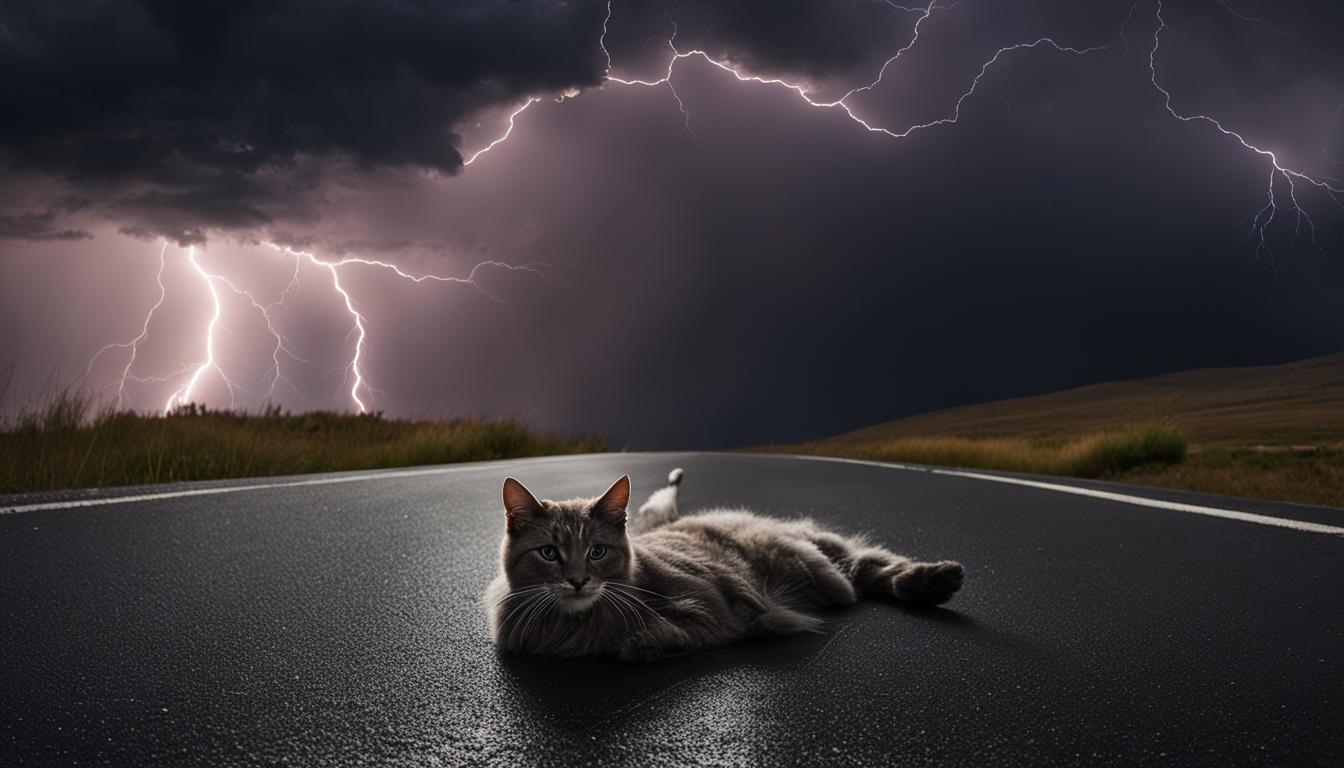Originally posted on November 1, 2023 @ 5:44 am
It’s a question that has mystified many for ages – is it bad luck to run over a cat? While some may view it as a simple accident, others believe it carries grave consequences. This topic is steeped in various superstitions and cultural beliefs that have been passed down through generations.
Throughout this article, we will explore the different superstitions surrounding running over a cat and what they signify. We will also examine the potential consequences of such an occurrence, both emotional and cultural. By understanding the origins of these beliefs and how they are perceived around the world, we can gain valuable insights into the myth and mystery of cats.
Key Takeaways:
- Running over a cat is a topic steeped in various superstitions and cultural beliefs.
- There are potential consequences of running over a cat, both emotional and cultural.
- Understanding the origins of these beliefs can provide valuable insights into the myth and mystery of cats.
- Superstitions surrounding cats and accidents may persist, but it’s important to approach the topic with rationality and understanding.
- Accidents happen, and it’s crucial to learn how to cope with the aftermath and navigate the emotions associated with these incidents.
Understanding Cat-Related Superstitions
As with many superstitions, the belief that running over a cat brings bad luck stems from a variety of beliefs and myths that have been passed down over time. While these beliefs may seem irrational to some, they hold deep cultural significance to certain individuals and communities.
The Symbolism of Running Over a Cat
In many cultures, cats are considered to be symbols of luck and prosperity. Running over a cat, therefore, is believed to bring about the opposite – bad luck and misfortune. Additionally, cats are often associated with the supernatural and the occult, further adding to the mysticism surrounding cat-related accidents.
Beliefs About Running Over a Cat
Many people believe that running over a cat can bring about a string of bad luck, from car trouble to financial difficulties. Some even believe that the bad luck can extend to family members, causing illness or accidents.
Another common belief is that running over a black cat is particularly unlucky. This stems from the historical association of black cats with witchcraft and magic.
Myths About Running Over a Cat
One common myth surrounding running over a cat is that the cat is actually a witch in disguise. According to this belief, witches are able to transform themselves into cats in order to spy on humans.
Another myth is that running over a cat will result in the cat’s ghost haunting the driver for years to come. This belief is particularly prevalent in Japanese folklore, where it is believed that cats have supernatural powers and are able to bring about both good and bad luck.
The Role of Culture in Cat-Related Superstitions
As with many superstitions, cat-related beliefs and myths are often deeply ingrained in specific cultures and communities. In some cultures, for example, cats are revered and considered to be sacred creatures. In others, they are seen as pests and omens of bad luck.
“In many cultures, cats are considered to be symbols of luck and prosperity. Running over a cat, therefore, is believed to bring about the opposite – bad luck and misfortune.”
By understanding the cultural context surrounding cat-related superstitions, we can gain a deeper appreciation of the beliefs and values held by different communities.
Cultural Beliefs and Superstitions
Cats have been an integral part of human culture for thousands of years. They have been revered as symbols of luck, fortune, and prosperity in some cultures, while in others, they have been associated with dark, mysterious, and even supernatural forces. As a result, cat-related superstitions and beliefs have evolved and taken on various forms, each with its unique interpretation and meaning.
One of the most common cat-related beliefs is that a black cat crossing one’s path brings bad luck. This superstition has its roots in ancient Egyptian mythology, where black cats were considered sacred and revered. However, during the Middle Ages, black cats became associated with witchcraft, and the belief that they were the familiar companions of witches spread throughout Europe.
Another common superstition is that if a cat sneezes near a bride on her wedding day, it is a sign of good luck. This belief is particularly prevalent in Russia and neighboring countries. In some cultures, it is also believed that if a cat washes its face with its paws or licks its fur, it is a sign that rain is coming.
Table: Cultural Beliefs and Superstitions
| Culture | Belief |
|---|---|
| Japan | A beckoning cat figurine (Maneki Neko) brings good luck and fortune. |
| Scotland | A cat sitting on a grave is a sign that the soul of the departed is being protected. |
| England | If a black cat crosses your path, it is bad luck. |
| Russia | If a cat sneezes near a bride on her wedding day, it is good luck. |
When it comes to cat accidents, many cultures believe that if a cat crosses your path and you accidentally step on its tail, it will bring you bad luck. In some cultures, it is also believed that if a cat enters a house uninvited, it brings with it bad luck and misfortune. In certain Asian cultures, a cat’s tail is considered a good luck charm, and it is believed that if you stroke a cat’s tail, it will bring good luck and prosperity.
Overall, cat-related superstitions and beliefs vary widely across cultures and regions. Some people take them very seriously, while others view them as mere folklore. However, it is fascinating to explore the historical and cultural context behind these beliefs and to understand the symbolism and meaning attached to cats and their actions.
The Origins of Cat Superstitions
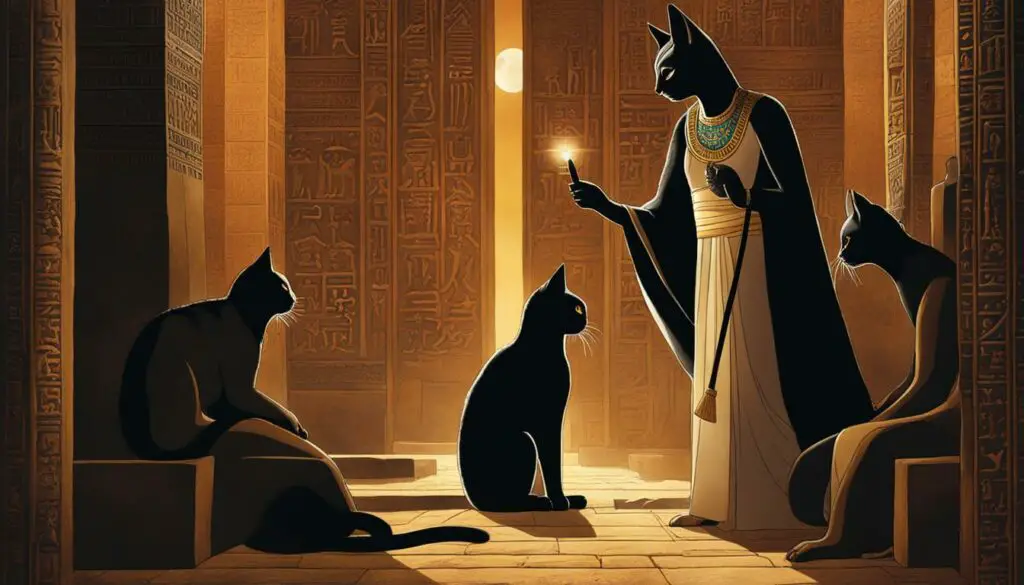
The origin of cat superstitions can be traced back to ancient Egypt, where cats were worshiped as gods and believed to possess mystical powers. It was common for cats to be mummified and buried with their owners, and harming a cat was considered a heinous crime punishable by death.
As Egyptian civilization spread, so did their reverence for cats, and over time, they became associated with luck, fertility, and protection. However, in some cultures, particularly in Europe during the Middle Ages, cats were seen as symbols of devil worship and witchcraft. Many believed that witches could transform into cats, and some even believed that cats were possessed by demonic spirits.
The Black Cat
The black cat, in particular, has a long history of being associated with bad luck and superstition. In many cultures, it is believed that if a black cat crosses your path, it is a sign of impending danger or misfortune. This belief can be traced back to medieval Europe, where black cats were often associated with witchcraft and Satanism.
Some even believed that black cats were witches in disguise and would harm those who crossed their paths. These beliefs were so entrenched that during the Salem Witch Trials in 1692, several people were accused of witchcraft after being seen with black cats.
The Number Nine
Another common cat superstition is the belief that cats have nine lives. The origins of this superstition are unclear, but it is often attributed to the number nine’s significance in ancient numerology, where it was believed to represent completeness or perfection.
However, some cultures believe that cats have seven lives, while others believe they have as many as 13. Still, others believe that cats have an infinite number of lives, and that each time they die, they are reincarnated in a new form.
“Cats were seen as symbols of devil worship and witchcraft. Many believed that witches could transform into cats, and some even believed that cats were possessed by demonic spirits.”
Regardless of the number of lives attributed to cats, this belief has contributed to the idea that cats are resilient creatures that can survive even the most hazardous situations. It also serves as a reminder to treat our feline friends with care and respect, as they are fragile creatures that deserve our love and attention.
In conclusion, the origins of cat superstitions are rooted in ancient cultural beliefs and mythologies. While the reasons behind many of these beliefs may be unclear, they have had a significant impact on our perceptions of cats and their role in our lives.
Cat-Related Superstitions Around the World
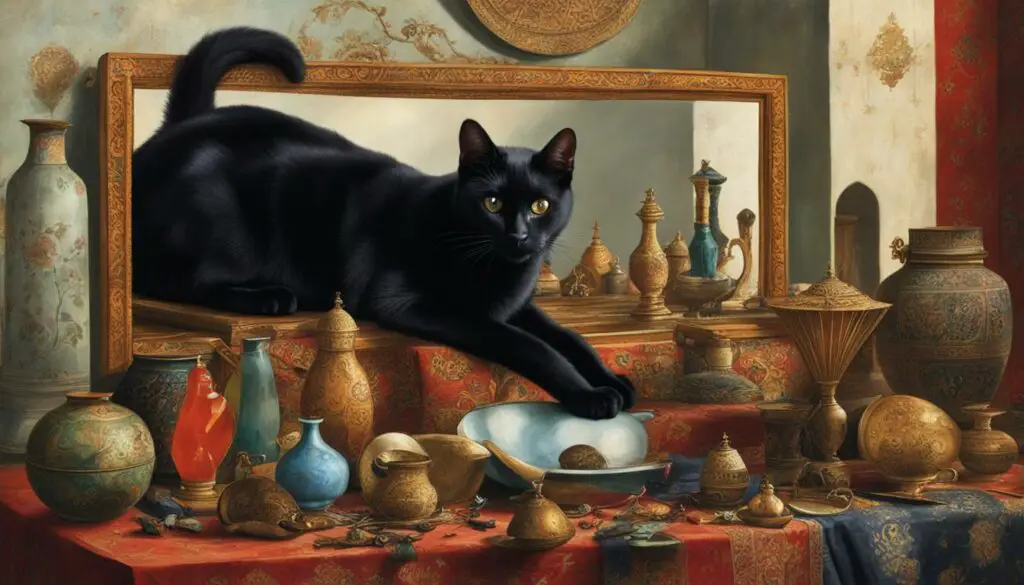
Cats have been revered and reviled throughout history, which has led to a plethora of cat-related superstitions across different cultures and regions. Let’s take a closer look at some of the most fascinating and unusual beliefs:
Africa
In Africa, cats are often associated with witchcraft and are believed to possess supernatural powers. It is said that if a cat crosses your path, it could be a sign that someone is trying to put a curse on you. In some areas, it is believed that owning a black cat brings good luck, while in others, it is seen as a bad omen.
Asia
Many Asian cultures see cats as symbols of luck and prosperity. In Japan, the “maneki-neko” or “beckoning cat” is a popular figurine believed to bring good fortune and wealth to its owner. In China, it is believed that a cat’s eye can heal various ailments.
Europe
In Europe, cats have long been associated with witchcraft and the occult. Black cats, in particular, were believed to be witches’ familiars and were often blamed for causing misfortune or even the plague. Even today, some European cultures consider it bad luck to let a black cat cross your path.
America
In the United States, cats are often associated with Halloween and are seen as symbols of mystery and magic. Many Americans believe that black cats bring bad luck, while others believe that they bring good luck. In some regions, it is believed that if a cat washes behind its ears, it is a sign that rain is on the way.
These are just a few examples of the many cat-related superstitions that exist around the world. Whether you believe in these beliefs or not, they are a testament to the enduring fascination humans have with these mysterious and beloved creatures.
The Consequences of Running Over a Cat
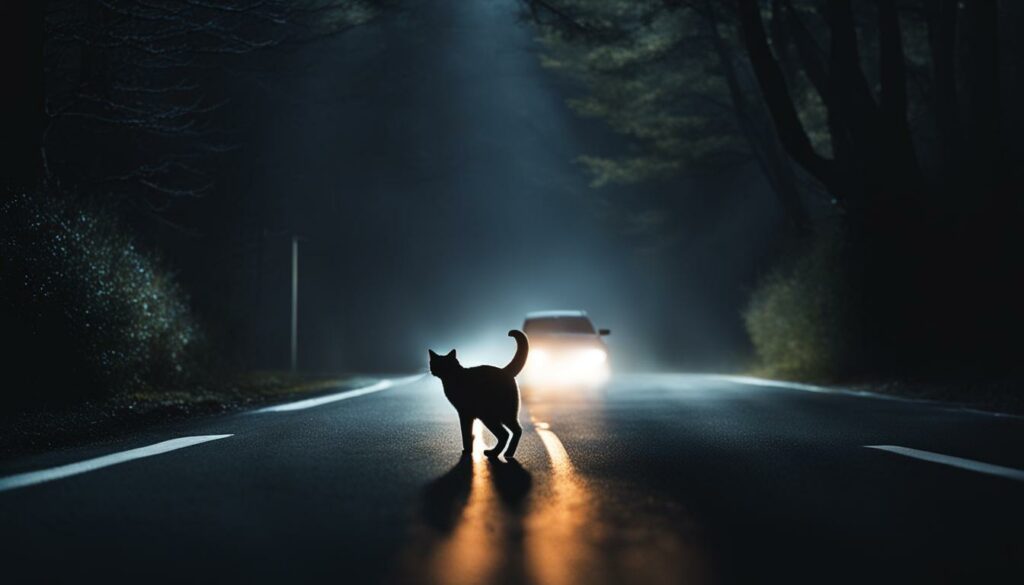
Running over a cat can have a range of consequences, from emotional distress to legal implications. For many people, the thought of harming a cat can be heartbreaking and lead to feelings of guilt and remorse.
From a legal perspective, drivers who hit cats may be held responsible for any damage caused to the vehicle, as well as any injuries or property damage caused to others as a result of the accident. In some cases, drivers may also face criminal charges if they intentionally cause harm to a cat or fail to take appropriate action after hitting one.
On a cultural level, beliefs about the consequences of running over a cat can vary widely depending on the society and traditions in question. In some cultures, running over a cat is considered a sign of bad luck or a harbinger of misfortune. This can lead to feelings of fear and anxiety for those who believe in these superstitions.
There are also broader cultural implications to consider. For example, in many societies, cats are revered and held in high esteem. Harming a cat can be seen as a sign of disrespect or disregard for the natural world and can have social consequences as a result.
Coping with Cat-Related Accidents
If you have hit a cat while driving, it’s important to take time to process your emotions and seek support if necessary. This may involve talking to a friend or loved one, seeking therapy, or participating in a support group for people who have experienced similar situations.
It’s also important to take responsibility for the accident and take appropriate action to ensure the safety and well-being of the cat. This may involve taking the cat to a veterinarian or animal shelter for treatment, notifying local authorities, or reaching out to the cat’s owner if possible.
Ultimately, coping with cat-related accidents requires a combination of empathy, responsibility, and a willingness to seek support when needed. With time and care, it’s possible to move forward after a difficult and emotionally charged incident.
Debunking the Myths
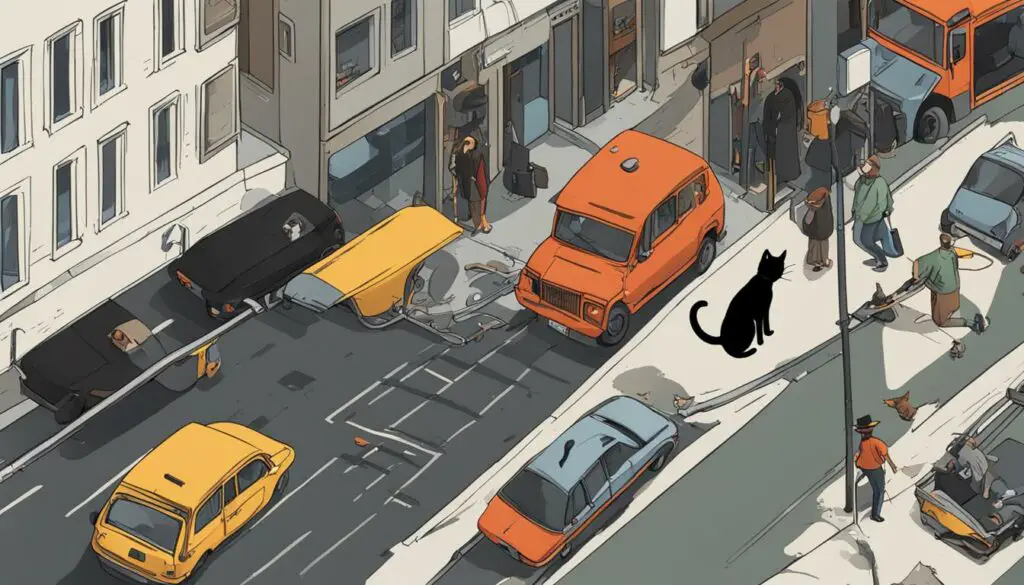
Despite the prevalence of cat-related superstitions, it’s important to approach this topic with a critical eye. Some of the most common myths and beliefs about running over a cat simply don’t hold up to scrutiny. Let’s take a closer look at some of these misconceptions:
“If you run over a black cat, you’ll have bad luck.”
This is perhaps one of the most well-known cat-related superstitions. However, there’s no evidence to suggest that black cats are any more or less likely to bring bad luck than cats of any other color.
“If you accidentally kill a cat, you’ll experience seven years of bad luck.”
While the consequences of a cat-related accident can certainly be difficult to deal with, there’s no reason to believe that this incident will somehow curse you with seven years of bad luck. This is simply a myth.
By debunking these and other common myths, we can approach the topic of cat-related accidents with more clarity and understanding. While it’s important to respect cultural beliefs, it’s equally important to approach these beliefs with a healthy dose of skepticism.
When dealing with a cat-related accident, it’s important to focus on practical solutions rather than superstitions. This might involve taking steps to ensure that you’re driving safely and attentively, or seeking support from loved ones as you process your emotions.
Ultimately, the key to navigating cat-related superstitions is to approach the topic with an open mind and a rational perspective.
Coping with Cat-Related Accidents
Running over a cat is an emotionally distressing experience. It’s natural to feel guilty, anxious, or even angry. Coping with these emotions is an essential part of moving on from the incident.
Firstly, it’s important to acknowledge and process the emotions you’re feeling. Give yourself permission to grieve the loss of the animal’s life, even if it was an accident. Talking to a trusted friend or family member can also help you process your emotions.
Secondly, it’s essential to take responsibility for what has happened. This means taking steps to prevent similar incidents in the future, such as driving more carefully or keeping a closer eye on your surroundings.
If you’re struggling with feelings of guilt or anxiety, consider seeking professional help. Talking to a therapist can provide you with the tools and support you need to work through these feelings.
Coping Strategies
Here are some coping strategies for dealing with the aftermath of a cat-related accident:
- Talk to someone you trust: a friend, family member, or therapist.
- Journal about your feelings to help process your emotions.
- Create a memorial for the cat to honor its life.
- Donate to an animal charity in memory of the cat.
- Take extra precautions to prevent similar incidents in the future.
Remember, there is no right or wrong way to cope with the aftermath of a cat-related accident. What’s important is finding a strategy that works for you and allows you to move forward.
“The greatest healing therapy is friendship and love.” – Hubert H. Humphrey
Coping with Cat-Related Accidents
Accidentally running over a cat can elicit a range of emotions from guilt and shame to fear and worry. Coping with these feelings is an essential part of moving on from the incident. Here are a few strategies for handling cat-related accidents:
Create a Support System
It’s okay to reach out to friends or family members for emotional support. Having someone to talk to about the experience can help alleviate stress and anxiety.
Talk to a Professional
If the accident is causing significant emotional distress, consider seeking out a therapist or counselor who can help you process your feelings and emotions in a healthy and constructive way.
Take Practical Steps
If the cat was someone’s pet, consider contacting the owner and offering condolences. If the cat was a stray, consider offering a small donation to a local animal shelter in memory of the cat. These practical steps can help bring a sense of closure to the incident.
Remember That Accidents Happen
It’s important to remember that accidents happen, and while they can be difficult to deal with, they do not necessarily have any cosmic significance or supernatural consequences. It’s possible to move on from the incident and find peace.
Conclusion
In conclusion, running over a cat may hold different cultural and personal significance, but it’s important to approach the topic with rationality and understanding. While it’s natural to feel upset and worried after such an incident, it’s important to remember that accidents happen and that it’s possible to move on. With the right support, coping mechanisms, and perspective, individuals can navigate the aftermath of a cat-related accident and find a sense of solace.
FAQ
Is it bad luck to run over a cat?
The belief that running over a cat brings bad luck is rooted in superstition and cultural folklore. However, the notion of bad luck associated with this act is subjective and varies among individuals.
What are some superstitions about running over a cat?
Superstitions surrounding running over a cat differ across cultures and regions. Some believe it brings financial misfortune while others associate it with the loss of luck or the need to perform a ritual to ward off bad luck.
What are the consequences of running over a cat?
The consequences of running over a cat can be emotional, cultural, and even legal. Individuals may experience guilt and worry, cultural backlash, or potential legal repercussions if the incident is reported to authorities.
Where do cat-related superstitions originate from?
Cat superstitions have historical roots and can be traced back to ancient civilizations. They often emerged from cultural beliefs, folklore, and religious practices that assigned symbolic meanings to cats.
Are there cat-related superstitions around the world?
Yes, cats have been the subject of various superstitions in different parts of the world. These beliefs and superstitions can vary greatly, highlighting the cultural diversity in how cats are perceived and the significance attached to cat-related incidents.
How can one cope with a cat-related accident?
Coping with a cat-related accident can be challenging. It’s important to acknowledge and process the emotions involved, seek support if needed, and take steps to prevent future accidents, such as practicing safe driving and keeping cats indoors.
Can the myths about running over a cat be debunked?
While superstitions persist, it’s important to approach the topic critically. Many of the beliefs surrounding running over a cat lack scientific evidence, and it’s crucial to evaluate them from a rational perspective rather than relying solely on folklore and superstition.
What advice is there for dealing with cat-related accidents?
Dealing with cat-related accidents requires understanding and compassion. It’s important to acknowledge any feelings of guilt or worry, seek support from loved ones or professionals if needed, and take steps to prevent future accidents, such as being vigilant on the road and ensuring cats are kept safe indoors.
